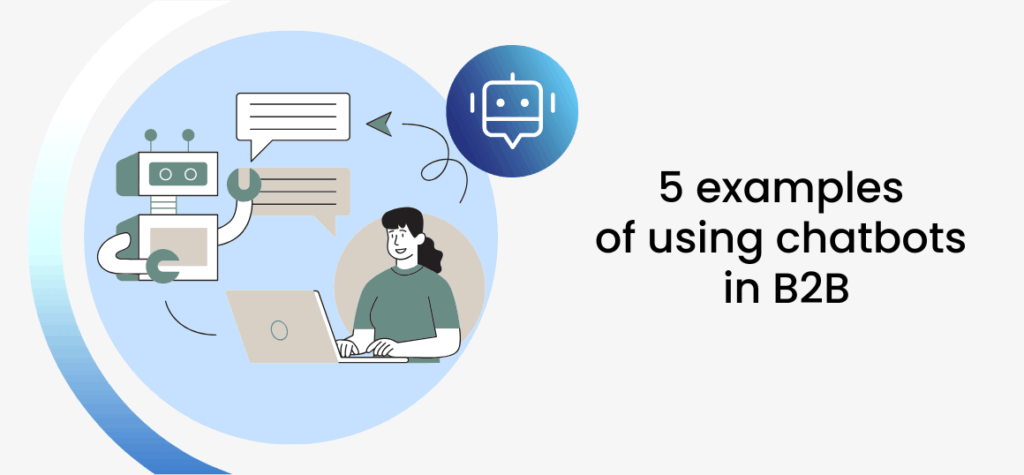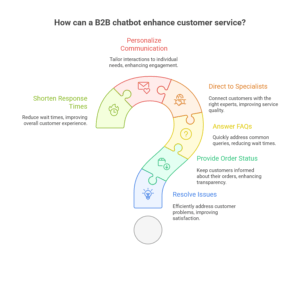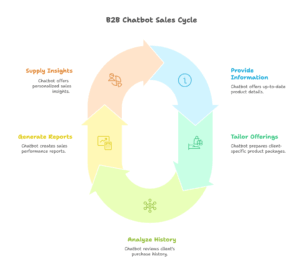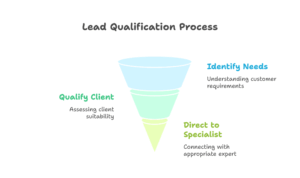5 examples of using chatbots in B2B

5 examples of using chatbots in B2B
It is assumed that the first B2B chatbot implementation in Poland took place around 2017–2018. Since then, the potential of this tool has significantly evolved. Today, it offers more functions that are also better refined. In many companies, using chatbots has already become a standard in business customer service. In this article, you will learn exactly what this tool is and discover 5 fundamental examples of using an AI chatbot in the B2B sector.
What are B2B chatbots and what should you know about them?
A chatbot is a modern tool that enables real-time communication with customers via text chat. These can be basic solutions following predefined communication paths or more advanced tools. The latter operate on artificial intelligence and are highly effective in ongoing customer support. They can interact with clients based on an updated database, answer basic inquiries, or even automate sales. Moreover, AI chatbots have the ability to learn, which means that during their use they gain valuable knowledge and can later leverage it by processing large amounts of data in a short time. In short, a chatbot is essentially a conversational bot in the form of written communication. It is commonly used on websites, social media profiles, online stores, and more.
Here are 5 examples of using AI chatbots in B2B
The potential of communication automation in the B2B sector is vast. While the first chatbots were primarily used to answer user and individual customer questions, these platforms have evolved over the years. It is worth focusing on chatbot solutions specifically designed for business clients. They enable personalized communication, automation, and cost savings while improving the quality of services provided. Such an AI assistant can bring numerous benefits. Below, we describe five key examples.
AI chatbots in automating business customer service
Of course, the primary use of such tools is to handle business customers. The advantage of chatbots is that they operate 24/7 while consistently maintaining a high standard of responses. A conversational bot of this type can take over a large portion of standard communication with business clients. This reduces the costs of maintaining a support team while providing customers with answers regardless of the time of day, night, or day of the week.
A properly configured and implemented B2B chatbot allows you to:
- resolve B2B customer issues,
- provide information about the status of a product or service order,
- answer frequently asked questions,
- direct customers to the right specialists (e.g., sales, technical, claims),
- personalize communication at every stage,
- shorten customer response times.

This works particularly well in B2B relationships, where clients often want to clarify or adjust an order. They can do this directly through the chatbot, saving valuable time. If, however, they find that the issue is more complex, they can choose the option to connect with a company representative, who will review the request, guide the client, answer questions, and provide possible solutions.
From the company’s perspective, the key benefit is that a chatbot integrated with a helpdesk system saves real time and money while improving business customer satisfaction. In practice, this tool can be implemented in almost any industry and across many tasks, including order management, complaint handling, answering questions, and supporting marketing activities. This increases the efficiency of the team, which can focus on more complex issues while the AI system handles the simple ones—streamlining the entire process. The shortened response time improves client satisfaction and reduces service costs for the company providing the product or service.
Supporting B2B sales teams
Another example of a chatbot in B2B is a tool that actively supports the work of sales teams. It can complement traditional marketing and telesales. The best chatbots in this category are considered virtual assistants for sales representatives. They provide valuable information around the clock, helping to personalize communication and guide the client along the purchasing journey. The ultimate goal is to assist the client better and improve conversion rates.
Key areas where a B2B chatbot can support sales include:
- providing up-to-date information on products, services, packages, and prices,
- preparing product offerings tailored to the specific client,
- analyzing the client’s purchase history and brand interactions,
- generating sales reports showing the number of attempts and conversion rates over time,
- supplying client insights that make the sales process more personalized.

AI-powered chatbots deliver measurable benefits at various stages of the sales funnel. The key is to use their potential skillfully and intentionally. Tools in this category are increasingly capable of understanding natural language and effectively applying machine learning. This means that their capabilities grow with each week of use in the company.
From the salesperson’s perspective, it is highly convenient to have continuous access to the company’s AI chatbot. When integrated with a CRM system, the tool provides up-to-date information. This enables the salesperson to prepare for a sales conversation more effectively, access key insights during the call, and improve overall performance. Top performers use this advantage to achieve their sales goals and break new records in B2B sales. Using a chatbot shortens the entire process and boosts conversion rates.
Lead generation and qualification for B2B sales
In various B2B industries, chatbots are increasingly used in the lead generation process. Once implemented on a website or social media channel, the chatbot engages the client with basic questions. The goal is to check the client’s intent and carry out initial qualification. Analytics of the data collected by AI tools allows the client to be placed at the appropriate stage of the sales funnel. Based on this, marketers and sales teams can implement a series of actions aimed at building engagement and trust in the brand until the lead is ready for conversion.
How do chatbots work in this area? Properly designed conversational paths focus on collecting essential data for customer support and sales teams. This includes personal information, company profile, scale of operations, budget, as well as problems and challenges the client wants to solve. This gives your company valuable insights that allow for an even better-tailored sales offer. In this way, you gain a competitive edge, and your services generate greater interest within the target group. Chatbots can help not only in lead generation (prospecting) but also in supporting the salesperson’s daily work, as described in the previous section.
Porozmawiaj z naszym specjalistą
The main tasks of AI-powered chatbots in lead generation include:
- identifying potential customers and their needs (so-called lead scoring),
- qualifying the client through questions (e.g., industry, company size, etc.),
- directing the client to the right specialist for nurturing or finalizing the transaction.

Next-generation AI chatbots are no longer just about answering customer questions. They go much further, offering advanced analytics and the ability to create communication paths for different departments within a company. All of this increases effectiveness and improves the quality of services provided.
Onboarding new employees, partners, or B2B clients
Another area worth highlighting is onboarding. Chatbots are increasingly used to support or even replace specialists in this process. A properly designed and implemented tool can effectively guide new employees through onboarding for their roles. This applies to technical specialists, customer service representatives, or sales staff. Faster onboarding means they can better meet business customer needs and respond to inquiries in line with company policy and real conditions.
In addition, onboarding chatbots work well internally within organizations as tools that:
- answer HR-related questions (e.g., vacations, benefits, etc.),
- support employees in IT, including reporting technical issues or resetting passwords for other tools,
- assist the purchasing department in ordering raw materials and supplies.
From this perspective, it is also worth considering how an AI chatbot can help with onboarding business partners or B2B clients. Such a tool can successfully guide a client through the registration process on a purchasing platform or answer product-related questions. The role of these AI agents is to guide business clients and partners through processes such as:
- B2B account registration,
- logging in,
- learning how to use the platform,
- placing orders.
Live chat plays an important role here as well. A B2B partner can not only follow the chatbot’s instructions but also actively ask questions to clarify any doubts. This reduces the workload of the support team. Many actions can be completed by the partner without involving their dedicated account manager. This is particularly useful when tasks need to be performed after office hours or on non-working days. Here, 24/7 chatbots come to the rescue—they don’t need vacations and never have downtime.
Advanced analytics powered by artificial intelligence
The fifth example of using chatbots in B2B is supporting decision-making processes. Chatbots based on natural language processing rules can generate and analyze large volumes of data. In fact, they collect additional information about customers every day. On the one hand, they assign this data to a specific record in the CRM database, and on the other, they enable deeper data analysis to identify business trends.
Chatbots can analyze vast amounts of data in a very short time—far beyond human capabilities. Moreover, users can precisely define the criteria that should be verified and evaluated. This is particularly useful when making strategic business decisions. Marketing departments are among the main beneficiaries, as they can use the data to forecast sales and prepare marketing campaigns aimed at achieving specific goals and targeting the right audience. This reduces the risk of financial losses caused by misidentifying the target buyer persona.
The data collected by chatbots is also valuable in planning tasks for the sales team, and sales directors often rely on it. On a broader level, this information may also reach company owners or managing directors, who can use it to identify trends and make key decisions. This, in turn, helps build a stable market position and increase company revenues. Leveraging the analytical potential of AI chatbots significantly reduces the risk of poor business decisions—making it a worthwhile investment.
Which companies use B2B chatbots?
Now that you know the five main applications of B2B chatbots, the next question is: which companies use them? The answer is both large global corporations and smaller entities offering specialized business products and services. In reality, any company should weigh the pros and cons to determine whether implementing such a solution makes sense at a given moment. From experience, we know that chatbots can automate many areas of business operations, while improving service quality and increasing business customer satisfaction.
Examples of B2B chatbot use in practice include:
- Zalando (European fashion brand),
- Amtrak (North American railway operator),
- Santander Consumer Bank,
- Wrocław Airport,
- Żabka – Franchisee Support Center,
- Trenkwalder,
- Bosch Home.
These are just a few examples of tools designed for interaction with business clients, which not only respond to customer inquiries but also guide them through various conversational paths. For example, Żabka created a dedicated support program for its franchisees. The potential of such chatbots in Poland is growing year by year. In many sectors, their use is already becoming a standard. An alternative to them are voicebots—voice-based bots that conduct real-time phone conversations.
Thinking about implementing a B2B chatbot? Contact our expert
Are you considering implementing a B2B chatbot in your company? Be sure to get in touch with our expert. At EasyCall, we have been supporting businesses for years in adopting AI-powered technological solutions. Our offering also includes chatbots—always tailored to the specific needs of each company. We take the time to fully understand your business situation and the challenges you face. Based on this, we prepare an implementation plan designed to ensure that the tool delivers benefits from day one and, in the long run, improves the quality of your services and increases your business clients’ satisfaction. We look forward to hearing from you.
